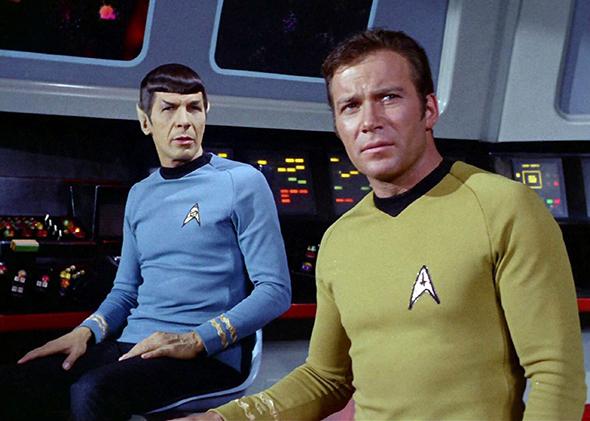This question originally appeared on Quora, the best answer to any question. Ask a question, get a great answer. Learn from experts and access insider knowledge. You can follow Quora on Twitter, Facebook, and Google Plus.
Answer by Robert Frost, engineer/instructor at NASA, hardcore Star Trek fan since I was 2:
Humanism. Gene Roddenberry, the creator of the original series, was an ardent humanist and imbued the show with those ideas, sometimes to the show’s success, sometimes to its detriment. Humanism is defined as “an outlook or system of thought attaching prime importance to human rather than divine or supernatural matters. Humanist beliefs stress the potential value and goodness of human beings, emphasize common human needs, and seek solely rational ways of solving human problems.”
Roddenberry believed that humans were wonderful creatures and would be responsible for their own accomplishments. He often said: “Ancient astronauts didn’t build the pyramids. Human beings built the pyramids, because they’re clever and they work hard.”
Through Star Trek he wanted to show a future where we had grown up and were reaching our potential. This view provided the optimism and inspiration that cemented the show into the hearts of so many viewers. But it made it a challenging show for the writers and actors. Roddenberry’s view that we would be better people in the time of Star Trek in effect changed human nature and removed many of the natural sources of conflict for the stories the shows told. Roddenberry was opposed to conflict between the crew members of the Enterprise. We could see the verbal sparring between Spock and McCoy, representative of their different cultures and used to highlight the human ideals by having Spock not be human, but not a lot of other friction between the crew. Roddenberry played an active role in the original series, rewriting scripts to bring them into line with his views.
By the time of Star Trek: The Next Generation, Roddenberry was ailing, and his role in the show decreased sharply after the first season. As other people ran the show, they struggled with the limitations they felt these views placed on the show, and the shows adapted. Star Trek: Deep Space Nine and Star Trek: Voyager, although still inspired by humanism, did not feel beholden to this idea that humans will have dramatically changed in just a few hundred years. They are noticeably different series, with far more conflict between the main characters.
Opinions vary on whether this helped or hurt the shows, but the humanistic perspective was essential to the show in the 1960s. The 1960s were volatile: Society was being asked to make dramatic changes in its views on race, sex, and many other issues. Roddenberry felt that progress was held back by the dogmatic structures of religions and politics that encouraged conservatism.
The ideas communicated through the original series are eternal ideas, but they really should be viewed in the context of the 1960s to understand why they are in Star Trek.
The Prime Directive introduced the idea that humans (Starfleet or the Federation) should not interfere in the development of other cultures. This was an overt statement against the U.S. involvement in Vietnam or, more broadly, the chess game between the U.S. and the Soviet Union, to establish their political philosophies around the developing world.
Infinite Diversity in Infinite Combinations introduced the idea that a diverse society is better than a monolithic one. This was an overt statement against segregation.
However, Roddenberry was no saint to his professed ideals. He may have dreamed of a future where money was not needed and there was no greed, but he intentionally introduced the IDIC symbol into Star Trek so that the mail-order company started by Roddenberry and his mistress could profit by selling the symbols to fans. This incident caused a rift between Roddenberry and Leonard Nimoy (Spock).
More questions on Quora:
